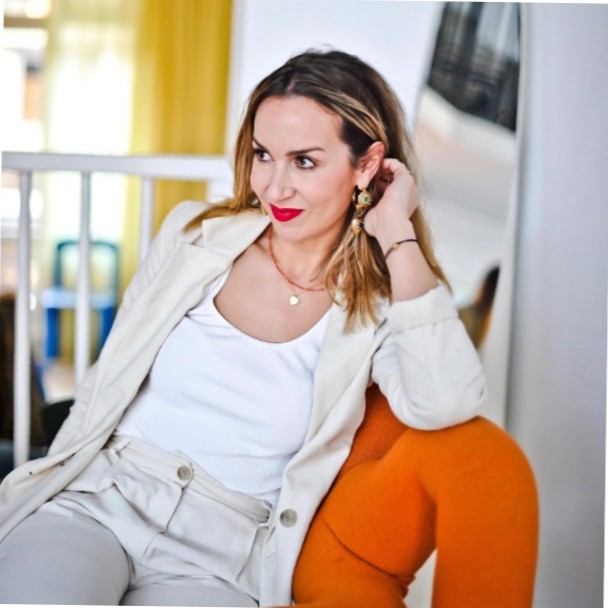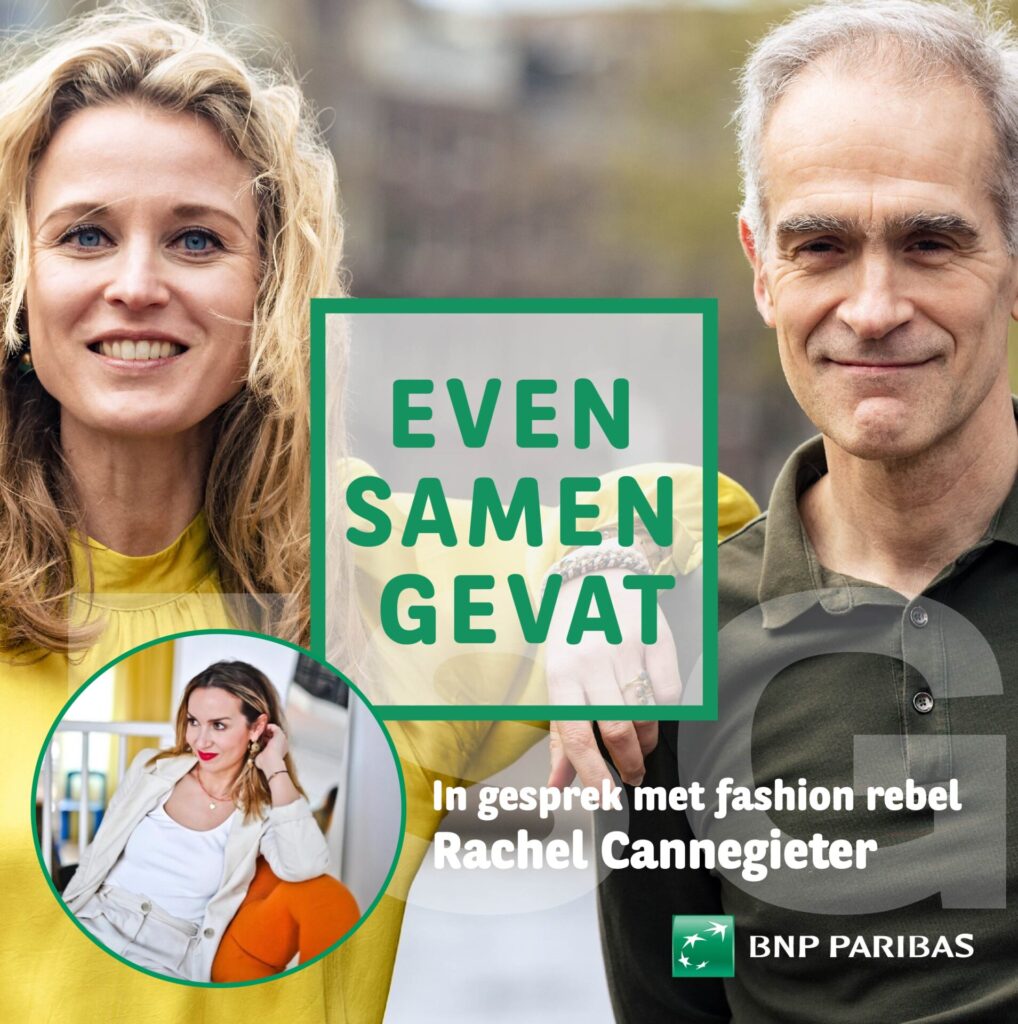Sustainability in the fashion industry: under the watchful gaze of others
In episode 37 of ESG (Even Samen Gevat) Marloes and Aldert speak with Rachel Cannegieter. She’s the founder of RethinkRebels, a circular impact consultancy that helps fashion companies make sustainable changes.
Even as a child, Rachel Cannegieter always knew she wanted to do ‘something in fashion’. And that dream came true: after finishing secondary school she went on to the Amsterdam Fashion Institute (AMFI), where in 2004 she wrote a thesis on ‘organic cotton’. Why organic? During her third year at the AMFI, she took a seminar that really made an impression and opened her eyes to the wrongs at clothing manufacturers. She had never thought about those things before. So for her thesis, she decided to interview a bunch of fashion companies and NGOs to get a picture of the situation in the sector. She then sent her findings and recommendations to everyone with whom she had spoken.
A buyer at a large international jeans brand replied: ‘You’re absolutely right, Rachel. But you know, if we start asking for organic cotton, our demand will exceed the supply.’ Rachel realised that it was time for a change in culture. She began by taking ‘a complete journey as a fashion professional’ to learn all about the sector, after which she started her company, RethinkRebels, in 2018. So now, she and her team help fashion companies become more sustainable.
What’s wrong in the fashion industry?
‘We simply produce and consume too much’, she says. ‘Someone else in the value chain pays the price for that.’ The result: child labour, forced labour and bad, unhealthy working conditions. ‘But there are loads of environment-related problems as well’, such as the use of some 8,000 chemicals and huge amounts of water.
Rachel calls the linear model in the fashion industry ‘extremely optimised’. Because of marketing, people have started to believe that they constantly need new clothes. The fast fashion chains make the most of that by offering new products ‘almost weekly’. ‘It’s a race to the bottom. Who can deliver the cheapest products in the shortest possible timeframe? The faster, the better, actually. That also has an effect on quality, because you always have to keep the price down. Manufacturers are obligated to go on producing at that pace.’
So, fashion companies need to become more sustainable and start producing less. But that’s not easy when ‘more is better’ is the name of the game. Actually, they don’t have much choice: based on the EU Green Deal and the Paris climate agreement, Europe must be circular and climate-neutral by 2050. And to fight greenwashing, there’s the Green Claims Directive, which will take effect in 2024: ‘It’s not meant to deter companies but, rather, to reward companies that really do things the right way.’
Incidentally, Rachel has no problem with companies making a profit, as long as that profit is separate from manufacturing new materials and products. And as the Ellen MacArthur Foundation has shown, that’s possible with a circular model. That foundation has calculated that there are plenty of opportunities for fashion companies: ‘Up to even $700 million worth.’
But how?
In the podcast, Rachel talks about business models that make sustainability in the sector attainable and attractive. She also gives lots of inspiring examples. These can be placed into four main categories: reuse, repair, remake and rent.
- Reuse: Dutch company MUD Jeans makes circular jeans and organises ‘rubbish-picking walks’ with their own community.
- Repair: The Sojo app in the UK can be used to have one of their bike couriers pick up your damaged clothes for repair and deliver them to your doorstep when finished.
- Remake: Danish fashion label Ganni redesigns dead stock, creating new fashion products that customers can rent.
- Rent: The US-based Rent the Runway platform uses artificial intelligence to analyse your wardrobe. The company grossed as much as $33 million in profit in 2022.
The key to all these examples of sustainability is cooperation in the chain. The chain is already ‘extremely complex’ to begin with, and reverse logistics make everything even more complicated: ‘Clothes need to be reconditioned, repaired, photographed and put up for sale again online as second-hand.’ You also need service providers for that.’

What role does Rachel’s company play?
The examples above show that there are already lots of innovative initiatives for making the sector more sustainable; and studies by McKinsey and PwC show that consumers want to buy more locally. But there’s still plenty of work to be done. RethinkRebels offers fashion companies support in this area because they often don’t know where to start. Nevertheless, Rachel feels like ‘a salmon swimming upstream to spawn. The fashion industry, too, will need to go upstream in order to become circular.’ She gives fashion companies a pragmatic nudge to work with her and her team to articulate their goals, develop a strategy and conduct a risk analysis and then to come up with the right KPIs for their business.
‘All in simple language so that everyone understands and knows what to do with it.’ It’s important for everyone in the chain to be on board. ‘That used to be somewhat less important: the product management, purchasing and design departments would develop a product, and sales and marketing would sell it. What we see today is that the whole story needs to be told much more clearly. So we help companies do that.’
Big changes are on the way for the fashion industry: ‘I truly believe that future wardrobes will be made up of one-third sustainable clothes – or at least clothes that people already have – one-third second-hand stuff and one-third rented items.’ Rachel once followed a training course by behavioural science expert Ben Tiggelaar and knows how difficult it is to change how we behave. But that’s easier if you work with someone from the outside: ‘You’ll feel obliged to do the right thing because you know they’re watching. For companies, that’s a business investment, which means they’re truly ready to go for it.’
And Rachel herself? Has there been any change in her own purchasing behaviour?
‘I myself didn’t buy anything for a whole year once’, she says. ‘Not a thing. That was nice, to be honest. It was so calming.’ Rachel says that purchasing behaviour is often a reaction to subconscious emotions and that it’s good to be made aware of them. She recently experienced the effect of ‘doing the right thing’ under the watchful gaze of others when she had styling coach Chiara (the ‘Indian in your wardrobe’ from Dutch television) come over for a whole day to see which clothes in her wardrobe work for her (and go together) and what might have been a waste of money. ‘That was so cool. You learn to take a fresh look at your own wardrobe.’
ESG Even Samen Gevat is a podcast series (in Dutch) in which Aldert Veldhuisen and Marloes Bergevoet talk to accelerators of the sustainable transition. They discuss topics related to the “E”, like green energy, CO2 emissions, raw materials, biodiversity, the “S” of health, diversity and inclusiveness and the “G” such as laws and regulations and international cooperation.
Also published in this series are:
- The energy transition is also geo-politics – with Rob de Wijk
- 100 conversations about sustainability – with Marnix Kluiters
- There is life after growth – with Paul Schenderling
Follow Even Samen Gevat here so you don’t miss an episode!
